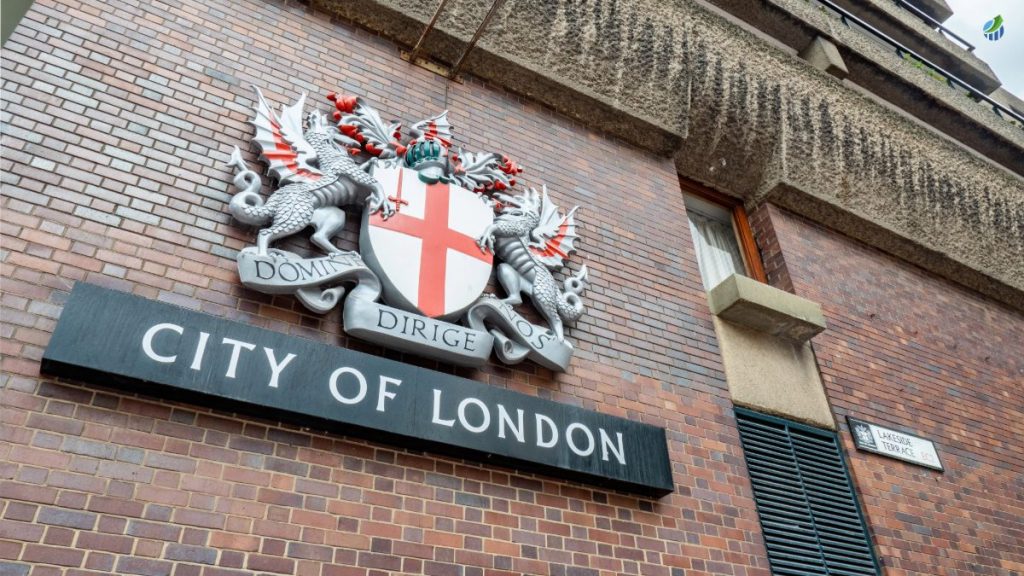The Bank of England, often viewed as the cornerstone of the UK’s financial system, operates from a unique jurisdiction known as the City of London. This is not the same as Greater London; rather, it is a private city within London itself.
According to Oliver L. Velez, a seasoned pro trader and author, this peculiar setup raises significant questions about transparency and accountability, particularly when compared to cryptocurrencies like Bitcoin.
The City of London: A Sovereign Entity

The City of London is an ancient and autonomous district that has its own set of rules, regulations, and governance. The City of London Corporation is one of the oldest continuously running municipal institutions in the world. Its origins trace back to Roman times, and it was formally established by Royal Charter in 1067 by William the Conqueror.
It has been described as having its own police force, legal system, and operates with a level of independence that is almost sovereign. This separation from Greater London and its unique privileges often draw comparisons to how certain financial and legal entities operate outside the typical frameworks of democratic oversight.
Governance:
- The City of London is governed by the City of London Corporation, an ancient institution that predates even the British parliament. The head of this corporation, the Lord Mayor of London, is not an elected official in the traditional sense but is chosen by the city’s own electors, a group primarily composed of representatives from businesses and other entities within the city.
- The Court of Aldermen, and the Court of Common Council complete the organisation’s governance. Unlike other municipalities in the UK, it operates independently with its own legal and governance structure.
- Unique to the City, businesses and other organizations can vote in local elections, in addition to residents. This system reflects the City’s commercial nature, where the workforce outnumbers the residential population significantly.
- The City of London has its own police force, the City of London Police, and maintains its own judicial system, adding to its autonomy from the rest of London.
- Critics argue that the City of London Corporation operates with a high level of secrecy, particularly regarding its financial dealings and the management of City’s Cash. This lack of transparency has raised concerns about accountability.
Financial Independence:
- The City of London is a major global financial hub, hosting numerous banks, insurance companies, and trading firms. It is also home to the Bank of England and a substantial portion of the world’s gold reserves. The autonomy and unique legal status of the City of London allow it to operate with a level of financial independence and secrecy that is rare for such a critical financial center.
- The City of London Corporation manages a substantial portfolio of properties and investments through its endowment fund, known as the City’s Cash. This fund is independent of public funding and supports many of the City’s activities.
- The City’s influence over national and international financial policies has been criticized as undemocratic. Some believe its unique position allows it to wield disproportionate power, influencing decisions that benefit the financial sector at the expense of broader public interests.
Gold Reserves and Lack of Transparency
Velez highlights a significant issue regarding the transparency of gold reserves held within the City of London. Major gold-holding nations like India and the United States store a significant portion of their gold in this private city, away from public scrutiny.
Secrecy and Uncertainty:
- The lack of public audits and detailed reports about the gold reserves stored in the City of London leads to widespread speculation and uncertainty. Velez points out that no one truly knows the exact amount of gold held, its authenticity, or its actual location. This opacity contrasts sharply with the ideals of transparency and accountability that are increasingly demanded in modern financial systems.
- There have been calls for reforming the City Corporation’s governance to align it more closely with democratic principles. Critics argue that its historical privileges and autonomy are outdated and need to be re-evaluated in a modern context.
Market Valuation:
- The estimated value of the world’s gold, cited at around $15.76 trillion, is derived from various market reports and assessments. However, Velez questions the reliability of these figures given the lack of verifiable audits. The inherent secrecy of the gold storage arrangements fuels doubts about the actual global gold supply and its valuation.
Bitcoin: The Transparent Alternative
Velez argues that Bitcoin offers a solution to the issues of transparency and accountability that plague the traditional financial systems and the gold markets. Bitcoin’s decentralized nature and public ledger provide an unprecedented level of transparency and security.
Public Ledger and Audits: Every single satoshi, the smallest unit of Bitcoin, is recorded on a public ledger known as the blockchain. This ledger is updated every ten minutes, and all transactions are publicly available for anyone to verify. This continuous and public auditing process ensures that the entire supply of Bitcoin is accounted for at all times.
Transparency and Trust: Unlike the opaque gold reserves, Bitcoin’s transparency builds trust among its users. The ability to independently verify transactions and the total supply of Bitcoin eliminates the need for trust in central authorities or custodians.
Decentralization and Security: Bitcoin operates on a decentralized network of nodes and miners, making it resilient against centralized control and manipulation. This decentralized structure ensures that no single entity can alter the ledger or create new Bitcoins arbitrarily, preserving the integrity of the system.
A Fair Comparison
The comparison between the City of London’s gold reserves and Bitcoin’s blockchain highlights a stark contrast in transparency and accountability. While the City of London operates with a level of secrecy that raises significant questions about the true state of global gold reserves, Bitcoin offers a transparent and verifiable alternative. As Velez aptly puts it, the question of what seems more real and trustworthy—opaque gold reserves or the publicly audited Bitcoin—becomes a matter of transparency and verifiability.
In an era where financial transparency is increasingly valued, Bitcoin’s public ledger and decentralized nature present a compelling case for a new paradigm in the world of value storage and transactions. As more people become aware of these issues, the demand for transparent financial systems is likely to grow, potentially driving broader adoption of cryptocurrencies like Bitcoin.
Author Profile

- Ex-community moderator of the Banano memecoin. I have since been involved with numerous cryptocurrencies, NFT projects and DeFi organizations. I write about crypto mainly.
Latest entries
- June 6, 2025NewsWireElon Musk to Decommission SpaceX Dragon after Trump Threat
- December 9, 2024Stock MarketMaster the Time Value of Money Financial Concept
- November 18, 2024Stock MarketFinancial Ratios Guide to Measuring Business Performance
- November 11, 2024NewsWireLabour’s UK Budget: A Fiscal Smirk of Contempt for Working People





